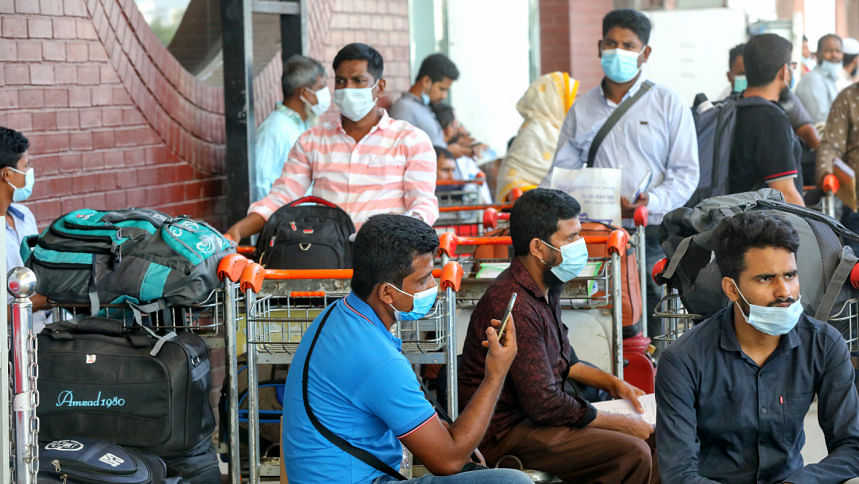Malaysia migration crisis shows where reforms are needed

On December 29, 2024, a group of Bangladeshi workers who had failed to migrate to Malaysia gathered for a protest in front of the Ministry of Expatriates' Welfare and Overseas Employment. They demanded the government's support in retrieving their passports and recruiting fees from the concerned agencies. Some of these agencies had falsely promised to send them to Malaysia in future, while others had closed their offices or pressurised the migrants to settle for lump sum payments. Despite the government's repeated assurances of reimbursing the recruitment fees, a majority of the workers have neither received their money nor their passports back from the recruiting agencies. Although Malaysian Premier Anwar Ibrahim promised to consider the entry of these 18,000 workers into Malaysia during his visit to Bangladesh on October 4 last year, the matter appears to have stalled.
From 2009-2024, Bangladeshi migrant workers' access to the Malaysian labour market was restricted multiple times, and, on every occasion, a syndicate was blamed for the debacle. Due to the repeated closure of the market as a direct impact of the infamous syndicate system, Malaysia-bound workers who failed to migrate had to suffer psychologically and financially. The operation of the Foreign Workers Centralised Management System (FWCMS), a web-based platform owned by the private company Bestinet in Kuala Lumpur that facilitates recruitment of migrant workers to Malaysia from different countries, has been alleged to be the key instrument of a syndicate involving powerful agencies in that country. Out of the 15 countries allowed to recruit migrant workers in Malaysia through Bestinet's system, only in the case of Bangladesh is there a separate arrangement restricting the participation of all recruitment agencies from the country.
The founder of the company, a Malaysian Dato of Bangladeshi origin, is alleged to be the mastermind behind the syndicate along with his accomplice, a former secretary general of the Bangladesh Association of International Recruiting Agencies (BAIRA). When the Malaysian labour market was set to reopen in 2022 after four years and an MoU was signed between the two countries, the Bangladeshi government relinquished the responsibility of selecting Bangladeshi recruiting agencies to Malaysian authorities. No specific guidelines were put in place for the selection of the agencies, which allowed unscrupulous agencies to form the syndicate. As a result, out of the list of 1,520 agencies submitted by the Bangladesh government, only 25 agencies were initially selected. Later, the number was increased to 101 in different phases. This primarily facilitated individuals linked to the fallen regime—such as MPs, councillors, and government officials—in setting up recruitment businesses. A section of the 101 agencies selected has been alleged to secure Tk 150,000 per worker from agencies not enlisted in the syndicate.
Media reports inform that the syndicate single-handedly increased the migration cost to Malaysia, raising it from the government-set Tk 78,990 to an average of Tk 5,44,000. The misery of those, who were unable to board flights to Malaysia even after paying the full migration costs, knows no bound. Now some of them have to bear the brunt of loans they incurred for trying to go abroad for a livelihood. Many migrant workers do not receive the promised jobs upon arrival at the destination country. Other issues they face include the unavailability of quality food and living conditions, wage theft, prolonged joblessness, mental and physical torture, and being jailed under false charges.
Realising the damage caused by Bestinet to migrant workers, it is of utmost importance that the perpetrators be brought to book. Media reports further inform that Bangladesh has recently requested Malaysia for the extradition of the two businessmen wanted for alleged money laundering and human trafficking crimes. Since then, the Malaysian Anti-Corruption Commission has also detained a Bangladeshi company director with a Datuk title on charges of corruption.
On Bangladesh's part, a case was filed against 103 individuals, including a former minister and secretary. In addition, immediate steps should be taken to ensure that agencies reimburse the full recruitment fees charged to migrants and return passports to the approximately 18,000 migrants who were unable to travel to Malaysia. Experts suggest that migrant workers who are unable to secure jobs despite paying hefty fees should receive compensation five times the amount they paid.
The syndicate system not just causes suffering to migrant workers but also tarnishes the country's image. The interim government took several positive steps to protect the interests of migrant workers, but the issues associated with the syndicate system of the Malaysian labour market must be addressed. Ensuring accountability should be the first step. Furthermore, the government should negotiate a bilateral agreement with provisions to ensure that all eligible recruiting agencies participate in the recruitment process when the market reopens, the errant agencies are penalised and the exploitation of migrants both at home and abroad is prevented.
Mohammad Inzamul Haque is project manager at Refugee and Migratory Movements Research Unit (RMMRU).
Views expressed in this article are the author's own.
Follow The Daily Star Opinion on Facebook for the latest opinions, commentaries, and analyses by experts and professionals. To contribute your article or letter to The Daily Star Opinion, see our guidelines for submission.

 For all latest news, follow The Daily Star's Google News channel.
For all latest news, follow The Daily Star's Google News channel. 







Comments